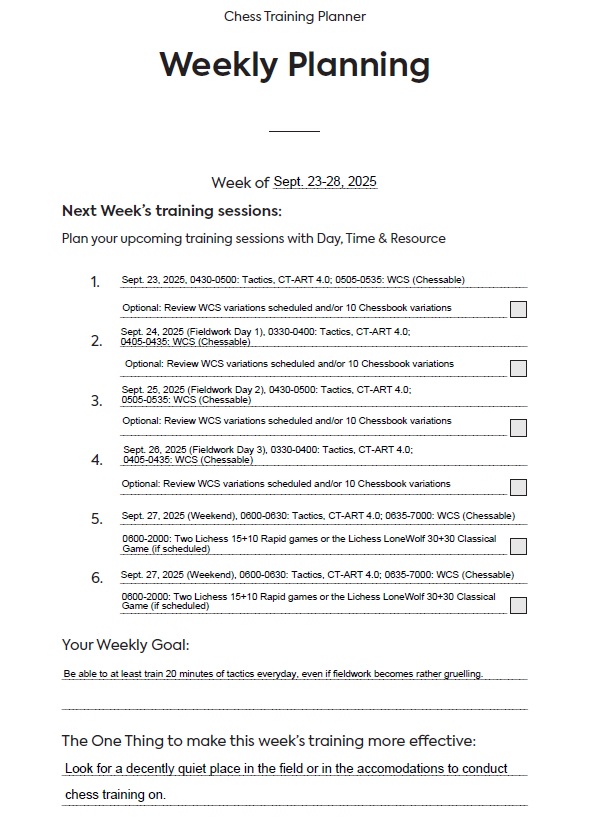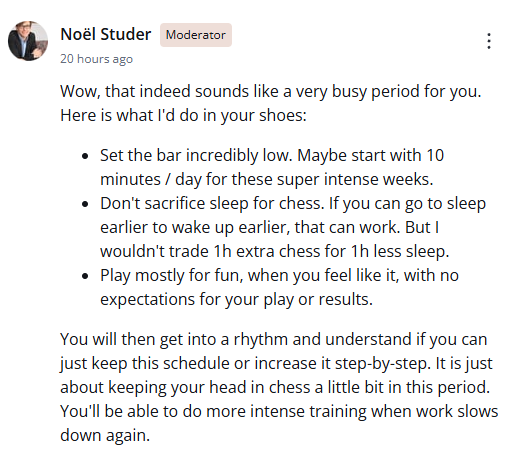Having a plan is great. But then real life happens, and it gets chaotic real quick.
- Family emergencies
- Intense work periods
- Illness
- Sleep issues
The list of possible things to get between you and your scheduled training is endless.
The key is not to avoid these – that’s impossible. What determines if you stick to your chess improvement is how you react to those real-life things happening.
Learning from the Master of Habits, James Clear, here is how.
Reduce The Scope, Stick to The Routine
The key to improvement is consistency. This idea, which I learned from James Clear, helps me stay more consistent when unexpected things happen. Or when a busy period is on the horizon.
Let’s look at how this works with the example of a student of the Simplified Chess Improvement System. Luis planned his week and realized that the upcoming period would be much more loaded with work.
Here is what he shared in the SCIS community:
The upcoming weeks are the real test of my consistency with this training method. In my workplace, weekly environmental fieldwork activities have been scheduled, and the government requires our outputs by the end of the year. It will involve waking up early every weekday to travel to the very depressed study sites, initiating work until noon, having a short lunch break afterwards, returning to work until it gets too dark to see, and then heading back to the accommodations to prepare for the next day. In other words, the probability of missing training due to sheer tiredness on a weekday is high. I would try to get around this by starting the training even earlier than I do right now, because I know that I would be too exhausted to train after all the field work for the day is done. I just hope I won’t lose too much sleep. – Luis
This really sounds gruelling.
He tried to adjust to those circumstances with the following weekly plan.

The ambition and dedication are really commendable. But the risk of something not going well, and losing sleep over chess training is simply too high.
Using the method of reducing the scope, stick to the routine. Here is what I answered:

Why This Works
Let me remind you that chess improvement is a marathon, not a sprint. I can relate all too well to keeping the full training plan the same way, even through such an intense period. That grind is also what I instinctively try to do.
Slowly but surely, I start learning my lesson that this just doesn’t work. In Luis’ case, sacrificing some extra sleep for chess training would be applauded by some male hardcore grinders online, but it is just not sustainable.
Even if he somehow pulled it off, the reduced sleep would have such a big impact on brain power that the whole training could be useless.
That’s why it is so important to come up with a routine that is sustainable even under difficult circumstances. I assume nearly everyone will be able to find time for 10 minutes of tactics every single day. And even if one is tired, focusing properly for 10 minutes is way more manageable than for 30-60 minutes.
You might argue that 10 minutes every day won’t have a big impact on his chess. That’s partly true. But what matters much more than the immediate improvement is that he can stick to his routine of chess training.
What Often Happens
I’ve seen the same pattern with myself and hundreds of students.
- Ideal training plan
- Super excited when it works
- Small hiccup
- “Can’t train for 1 hour – so I won’t train at all”
- Where did my chess routine go? Why am I not training at all for 2 weeks?
When we set too ambitious goals with our training, when the inevitable “real life” stuff happens, we are at risk of breaking the routine and not getting back for a loooooong time.
If we keep the habit of training, it will be so much easier to just increase the scope when we have more time and energy.
The hardest thing is creating the habit in the first place. So no matter how small, when real life gets in the way, aim to reduce the scope, but stick to the routine.
Or how James Clear ends his article How to Stick to Your Goals When Life Gets Crazy,
When you can’t do it all, do something small.
Keep improving,
GM Noël Studer
PS: Want better habits? Read James Clear’s bestseller, Atomic Habits.
PPS: This article was initially sent out to my Newsletter list. If you want to get chess improvement advice for free in your inbox, join 17,000+ chess improvers by signing up for Friday Grandmaster Insights here.
Whenever you’re ready, here is how I can help you:
- Want to know How to train chess well? Check out The Simplified Chess Improvement System. This course taught 800+ students the How of Chess Training. Create your high-quality chess plan and learn how to study each part of Chess, from tactics to openings & endgames. Click here to learn more.
- Rated below 1200 Chess.com? Need to refresh your fundamentals? Check out my course, Beginner Chess Mastery. You’ll learn all the fundamentals, from strategy to how to get the most out of your pieces, tactics, and endgames. You even get a full opening repertoire for free. Click here to learn more.